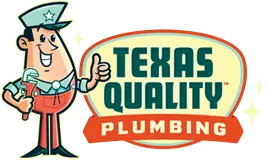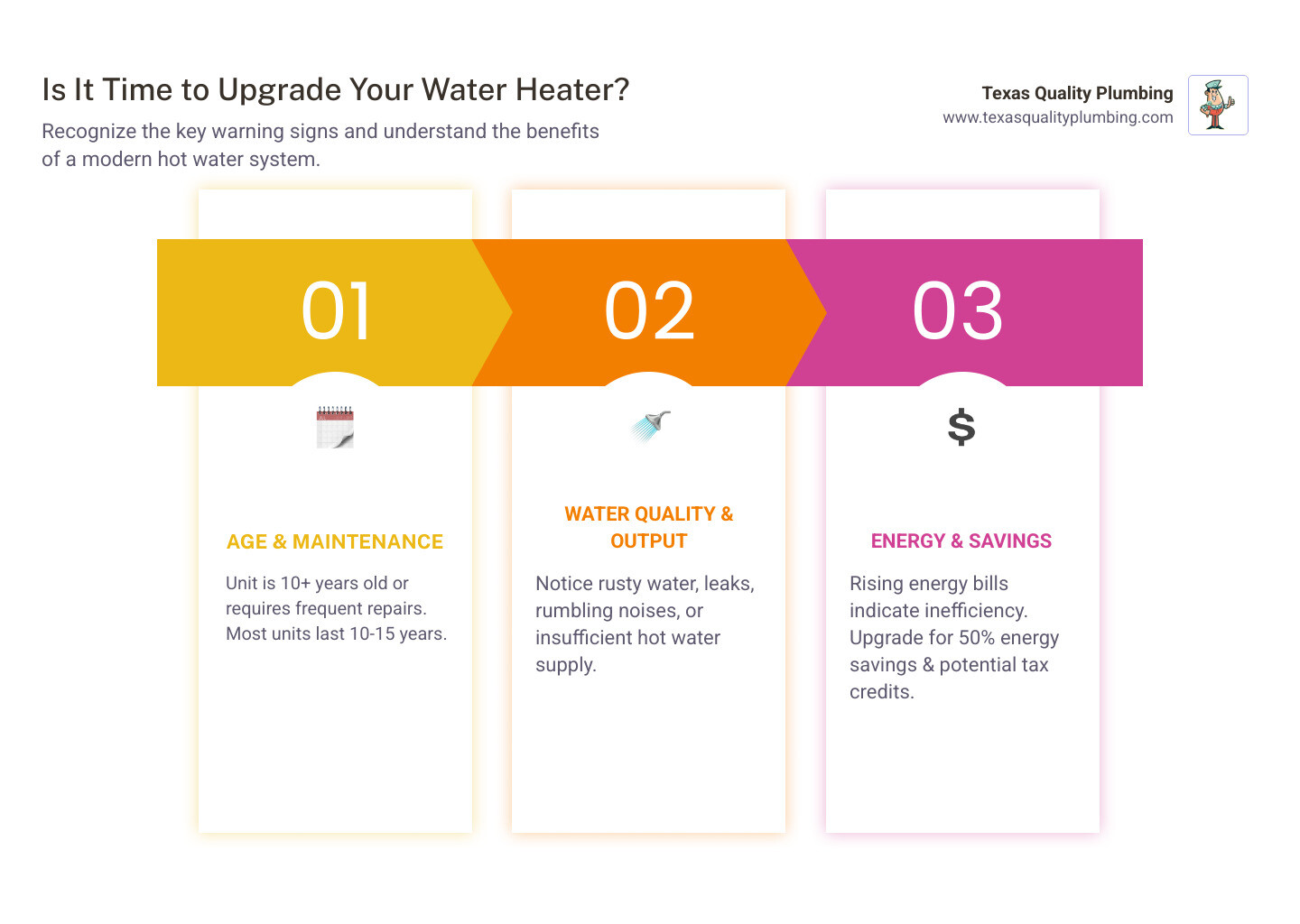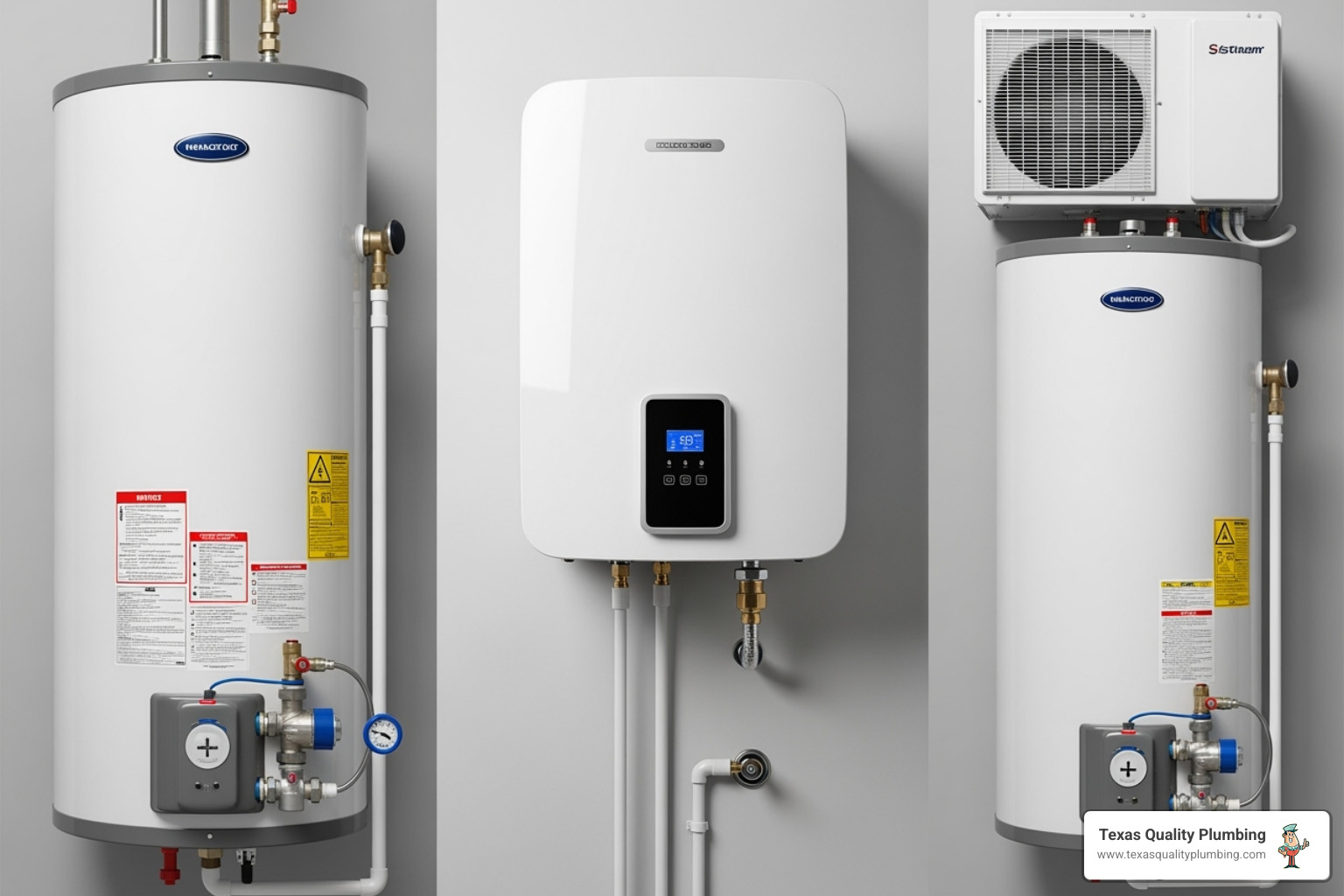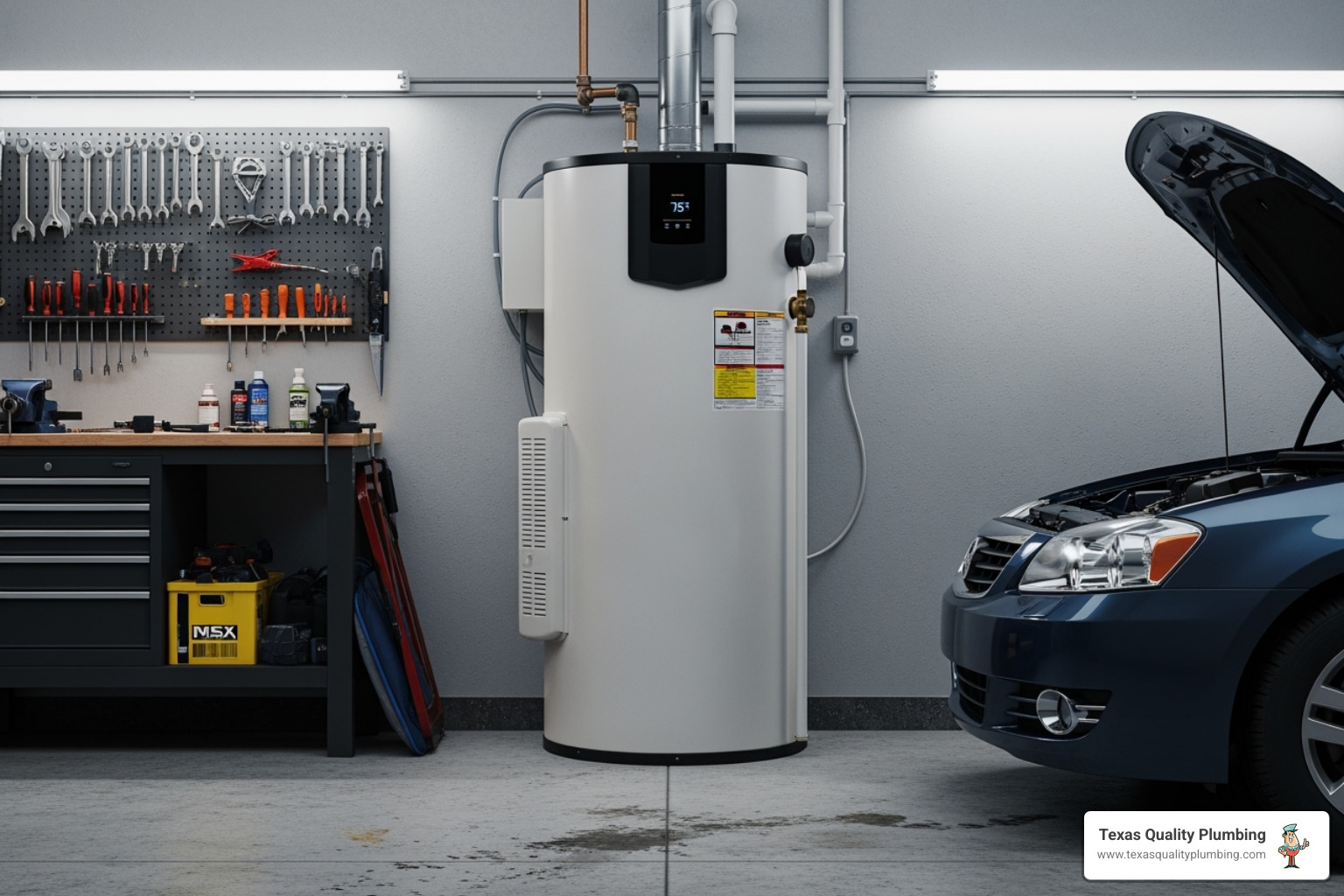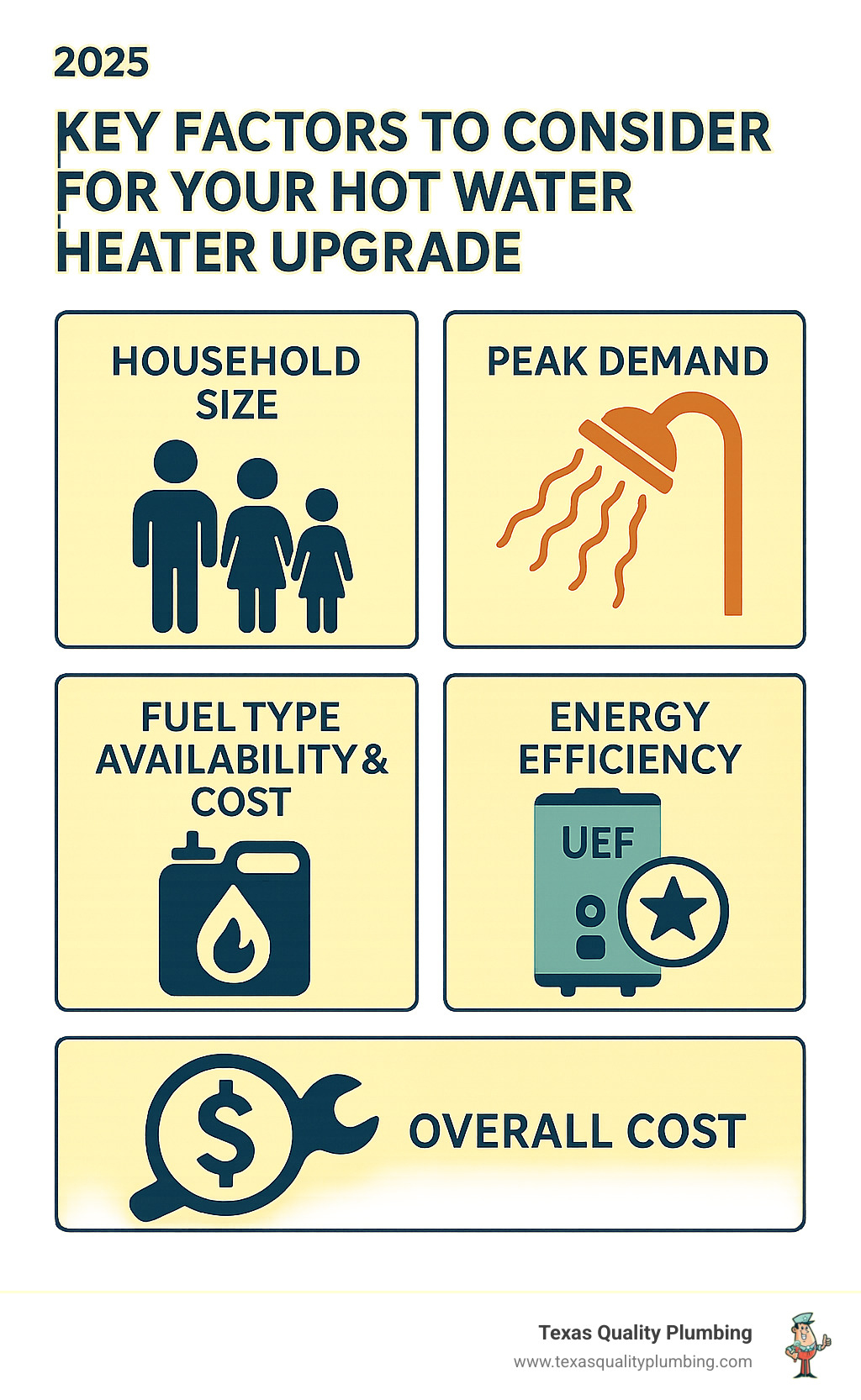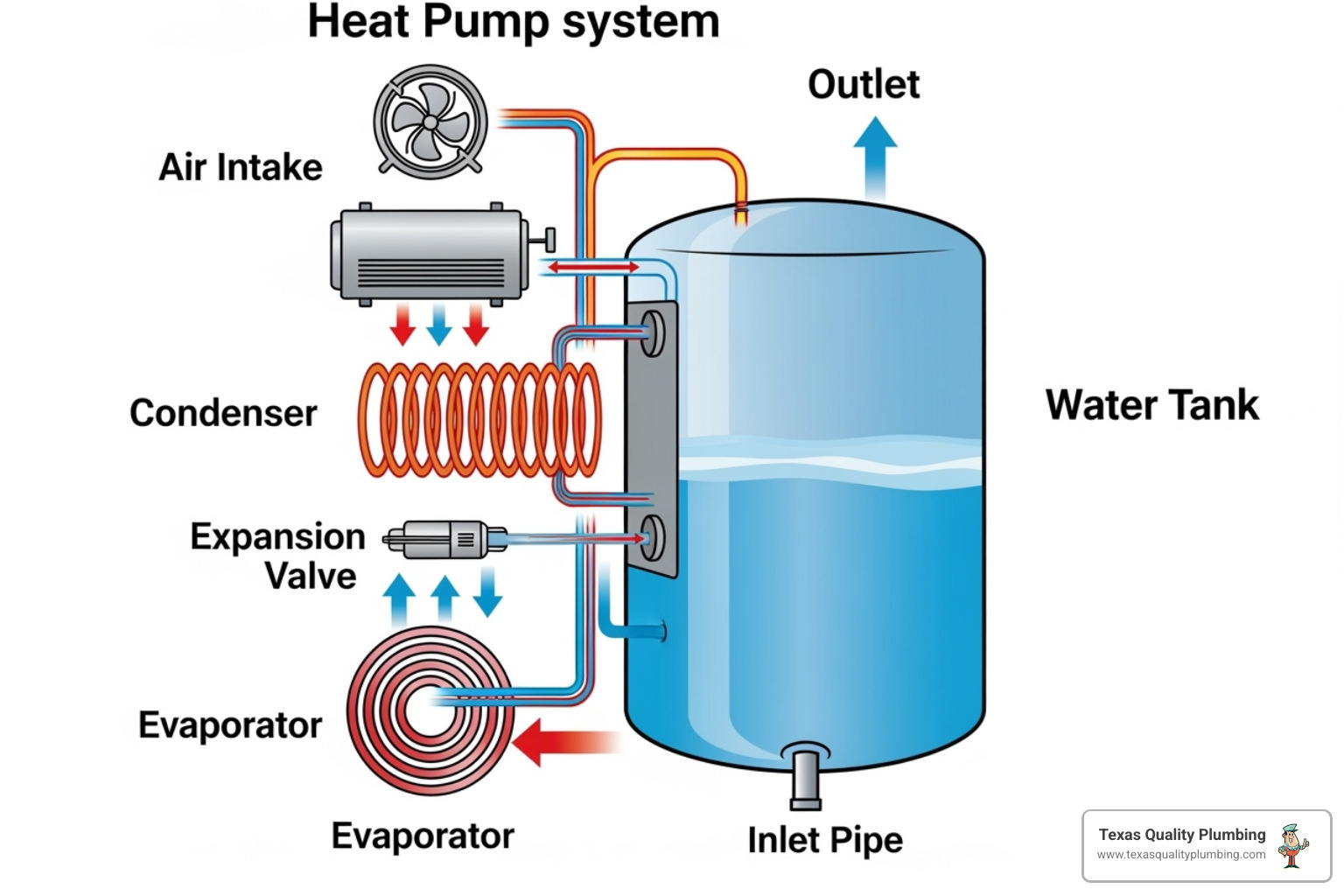Why a Hot Water Heater Upgrade Could Be Your Best Home Investment
A hot water heater upgrade can save you hundreds of dollars annually and prevent unexpected breakdowns. Water heating is the second-largest energy expense in most homes, accounting for about 12% of total energy use. Replacing your unit before it fails is a smart move that avoids emergency costs and lets you choose the best model for your needs.
Top Upgrade Options:
- Conventional Tank: Lower upfront cost, ready hot water supply.
- Tankless (On-Demand): Endless hot water, 20+ year lifespan, high energy savings.
- Heat Pump (Hybrid): Uses up to 50% less energy, delivering significant long-term savings.
Consider Replacement When:
- Your unit is over 10 years old.
- You see rusty water or hear strange noises.
- Hot water runs out too quickly.
- Your energy bills are rising unexpectedly.
An ENERGY STAR certified heat pump water heater, for example, can save a household of four over $330 per year. Understanding your options is the first step toward making a smart investment for your Houston home.
7 Telltale Signs Your Water Heater Needs Replacing
Your water heater often shows signs of trouble before it fails completely. Recognizing these warnings can save you from the cost and inconvenience of an emergency replacement and potential water damage.
- Age: Most conventional tank water heaters last 10-15 years. If your unit is over a decade old, it’s time to plan for a hot water heater upgrade.
- Leaks: Any moisture or puddles around the base of your tank can indicate an internal crack, risking a major flood. Early replacement is far cheaper than repairing water damage.
- Rusty Water: Discolored hot water is a clear sign that the inside of your tank is corroding. This can stain fixtures and clothes.
- Strange Noises: Rumbling or popping sounds often mean sediment has built up in the tank. This buildup forces the unit to work harder, reducing efficiency and shortening its lifespan.
- Insufficient Hot Water: If your hot water supply has diminished despite no change in usage, it’s a sign of sediment buildup or failing heating elements.
- Rising Energy Bills: A less efficient water heater consumes more energy to do its job. Unexplained increases in your utility bills can point to a failing unit.
- Frequent Repairs: If you’re constantly calling for repairs, investing that money in a new, reliable unit is a more cost-effective solution.
For more details, see our guides on When to Replace Your Water Heater and Signs You Need Water Heater Repair.
Determining Your Water Heater’s Age
The age of your water heater is usually encoded in the serial number on the manufacturer’s sticker. The first few characters typically represent the year and month of production. You can decipher these codes using charts from the International Association of Certified Home Inspectors (InterNACHI). Knowing your unit’s age allows you to proactively plan for a hot water heater upgrade instead of waiting for a sudden failure.
The Risk of Waiting for Failure
Waiting for your water heater to fail completely is a risky and expensive gamble. A sudden breakdown often leads to:
- Higher Emergency Costs: You’ll pay premium rates for emergency service and have fewer choices, likely settling for whatever model is immediately available.
- Catastrophic Water Damage: A tank rupture can release dozens of gallons of water, causing thousands of dollars in damage to floors, walls, and personal belongings.
- Inconvenience: Living without hot water disrupts your daily routine, from showers to washing dishes.
- Mold Growth: The moisture from a leak creates a perfect breeding ground for mold, which can cause health issues and require costly remediation, as warned by the EPA.
A proactive replacement allows you to choose the best model for your home, control the timing and cost, and take advantage of potential rebates and savings.
Exploring Your Upgrade Options: From Tank to Tankless
When it’s time for a hot water heater upgrade, you have several excellent options. The best choice depends on your household’s needs, budget, and long-term energy goals.
Here’s a comparison of the three main types:
| Feature | Conventional Storage Tank | Tankless (On-Demand) | Heat Pump (Hybrid) |
|---|---|---|---|
| Upfront Cost | Lower | Higher | Moderate to Higher |
| Operating Cost | Moderate to High | Lower | Lowest |
| Lifespan | 10-15 years | 20+ years | 10-15 years |
| Space Req. | Large tank | Compact, wall-mounted | Large tank, good air flow |
| Hot Water | Limited supply | Endless supply | Large supply, very efficient |
Our guide on Types of Water Heaters provides a deeper dive into your options.
Conventional Storage Tank Water Heaters
These traditional units keep a reservoir of 30 to 80 gallons of water heated and ready for immediate use. Their main advantage is a lower initial cost, making them a budget-friendly choice. Gas models typically heat water faster and have lower operating costs, while electric models are simpler to install. The primary drawback is standby heat loss, where energy is used to keep the stored water hot even when it’s not being used.
Tankless (On-Demand) Water Heaters
Tankless models heat water instantly as it flows through the unit, eliminating the need for a storage tank. This on-demand system prevents standby heat loss, leading to energy savings of 27-50%. Key benefits include an endless supply of hot water and a compact, space-saving design. While the upfront cost is higher, many Houston homeowners find the long-term savings, convenience, and 20+ year lifespan to be a worthwhile investment. Learn more on our Tankless Water Heaters page and find the Benefits of Tankless Water Heaters.
Heat Pump (Hybrid) Water Heaters
Heat pump water heaters are highly efficient because they move heat instead of creating it. They pull heat from the surrounding air and transfer it to the water in the tank. This process uses about 50% less energy than standard electric models, resulting in significant cost savings. These units require adequate space for air circulation (like a garage or basement) and produce cool, dehumidified air, which is often a benefit in Houston’s humid climate.
Choosing the right hot water heater upgrade depends on your family’s usage, home layout, and budget. Our experts can help you steer these options to find the perfect solution.
Key Factors to Consider for Your Hot Water Heater Upgrade
A successful hot water heater upgrade requires matching the unit to your home and lifestyle. Key factors include household size, daily routines, available fuel types, and energy efficiency goals.
The U.S. Department of Energy’s guide on Selecting a New Water Heater offers detailed information to help you choose a system that provides enough hot water while saving you money.
Sizing Your New Water Heater Correctly
Proper sizing is crucial for comfort and efficiency. An undersized unit won’t meet your needs, while an oversized one wastes energy.
- For storage tank heaters, we use the First Hour Rating (FHR), which indicates how many gallons of hot water the unit can supply in one busy hour. This is based on your family size and peak usage times.
- For tankless heaters, we calculate the required Gallons Per Minute (GPM) flow rate. This ensures the unit can supply enough hot water to multiple fixtures running simultaneously.
Correct sizing maximizes comfort while minimizing energy bills.
Fuel Types and Costs
Your available fuel type in Houston will influence both upfront and long-term costs.
- Natural Gas: Widely available and often the most cost-effective option. Gas heaters heat water quickly and efficiently.
- Propane: A good alternative for homes without natural gas access, though typically more expensive per unit of energy.
- Electricity: Universally available. While traditional electric models can be costly to run, highly efficient electric heat pump models offer some of the lowest operating costs.
Switching fuel types may require new gas lines or electrical upgrades. We can help you analyze utility rates and conversion costs to determine the most financially sound option for your home.
Understanding Energy Efficiency Ratings
Efficiency ratings predict your long-term operating costs. A higher rating means lower monthly bills.
- The Uniform Energy Factor (UEF) is the standard measure of efficiency. The higher the UEF number, the more efficient the water heater.
- ENERGY STAR certification indicates that a unit meets strict efficiency guidelines set by the EPA. An ENERGY STAR model can save a family of four over $330 annually compared to a standard unit.
For immediate savings, consider lowering your water heater’s thermostat. A setting between 140°F and 147°F is typically recommended to balance energy savings with safety.
The Rise of Heat Pump Water Heaters: The Efficiency Champion
For the ultimate hot water heater upgrade in efficiency and savings, consider a heat pump water heater. These units work like a refrigerator in reverse, capturing ambient heat from the surrounding air and transferring it to the water in the tank.
This innovative process uses electricity to move heat, not create it, which is why an ENERGY STAR certified heat pump water heater uses an average of 50% less energy than a standard electric model. They also include backup heating elements to ensure you always have hot water during periods of high demand. Houston’s warm, humid climate makes these units especially effective year-round.
Benefits of a modern hot water heater upgrade
Choosing a heat pump water heater offers significant advantages:
- Lower Electricity Bills: A typical family of four can save over $600 annually on electricity compared to a standard electric water heater.
- Reduced Carbon Footprint: Using less energy significantly cuts greenhouse gas emissions.
- Quick Payback Period: The higher upfront cost is often recovered through energy savings in just two to three years.
- Improved Home Safety: Switching from a fuel-burning unit to an electric heat pump model eliminates the risk of carbon monoxide from combustion.
For more on how these technologies benefit Houston homeowners, see our guide on Updating Water Heater Efficiency Houston.
Installation and Space Considerations
To operate at peak efficiency, heat pump water heaters have specific installation requirements:
- Space: They need about 700 cubic feet of air space (a 7’x10′ room) for proper circulation, making them ideal for garages, basements, or large utility rooms.
- Ventilation: Good airflow is essential. A louvered door may be needed for closet installations.
- Condensate Drainage: These units dehumidify the air, producing condensate that must be routed to a floor drain or pump.
- Electrical: Most models require a dedicated 240V electrical outlet.
- Sound: They operate at about 50 decibels, similar to a quiet conversation, which is barely noticeable in a garage or utility area.
Our team will evaluate your space to ensure a heat pump installation is a perfect fit for your home.
Navigating Costs, Rebates, and Professional Installation
Understanding the total investment for a hot water heater upgrade involves looking at the equipment cost, professional installation, and any necessary code-related updates. Professional installation is a critical part of the investment, ensuring safety, efficiency, and compliance with local building codes.
Our team handles all aspects of the Process of Water Heater Installation, including navigating local codes and permits in Houston, Cypress, Katy, and surrounding communities, to ensure your new system is installed correctly and safely.
What to expect from the hot water heater upgrade process
Our process is designed to be smooth and stress-free:
- Initial Assessment: We evaluate your current system, discuss your household’s needs, and recommend the right water heater type and size.
- Site Preparation: We verify that electrical or gas connections, ventilation, and the installation area are ready for the new unit.
- Old Unit Removal: We safely disconnect and responsibly dispose of your old water heater.
- New Unit Installation: Our licensed technicians install your new heater according to manufacturer specifications and local codes.
- Safety Checks: We conduct thorough pressure tests and leak checks to ensure all connections are secure.
- Customer Education: We walk you through your new system’s operation and provide maintenance tips for long-term efficiency.
You can Trust Technicians for Water Heater Installation when you work with our team.
Finding Financial Incentives
Upgrading to an energy-efficient model can significantly reduce your upfront cost through various incentives:
- Federal Tax Credits: The Inflation Reduction Act offers a tax credit of 30% (up to $2,000) for qualifying ENERGY STAR heat pump water heaters. This Save with Tax Credits for Energy Efficiency (Video) explains the benefits.
- Local Utility Rebates: Many Houston-area utility providers offer rebates for installing energy-efficient appliances.
- Manufacturer Incentives: Manufacturers often provide their own rebates or promotions on high-efficiency models.
- Assistance Programs: Programs like the Weatherization Assistance Program may be available to help qualifying families with energy-efficient upgrades.
We can help you identify all available rebates and credits to ensure you get the best possible value on your hot water heater upgrade.
Make the Right Upgrade for Your Houston Home
A hot water heater upgrade is a smart investment in your home’s comfort, efficiency, and value. Choosing a modern tankless or heat pump model leads to significant energy savings, a reliable hot water supply, and a longer equipment lifespan.
Professional installation is key to open uping these benefits. A properly installed water heater operates safely, maximizes efficiency, and complies with all local building codes. Our experienced team understands the unique needs of Houston-area homes and is committed to providing high-quality, efficient service.
We respect your time and property, ensuring every installation in Cypress, Katy, Sugar Land, and beyond meets the highest standards. From the initial assessment to the final safety check, we make your hot water heater upgrade a seamless and stress-free experience.
For expert advice and a professional installation of your new, efficient water heater, explore our Houston tankless water heater services. We are ready to serve you throughout Houston and all surrounding areas.
